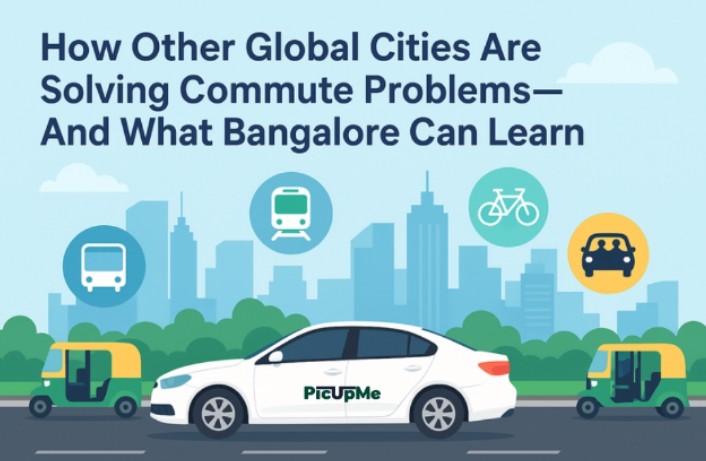How Other Global Cities Are Solving Commute Problems—And What Bangalore Can Learn

Bangalore’s traffic jams are legendary. From unpredictable auto fares to endless waiting during peak hours, commuting can feel like a daily battle. But Bangalore isn’t alone—many global cities have faced similar challenges. The difference? Some have found innovative mobility solutions that balance affordability, accessibility, and sustainability. By looking at how other cities solved their commute struggles, Bangalore can explore smarter ways forward—especially through subscription-based mobility models like PicUpMe.
1. Singapore: Seamless Public Transport Integration
Singapore transformed its congested roads by integrating buses, metros, and ride services into one smart mobility ecosystem. With real-time apps and cashless payments, commuters enjoy predictability and convenience.
✅ Lesson for Bangalore: Integration is key. Instead of treating autos, metros, and buses as separate, Bangalore needs a unified approach—where subscription apps like PicUpMe bridge the last-mile gap.
2. London: Congestion Charges and Incentives for Shared Rides
London introduced congestion pricing to discourage solo car rides and invested heavily in carpooling and subscription-based ride options. This reduced traffic and encouraged citizens to rethink private ownership.
✅ Lesson for Bangalore: Instead of adding more vehicles, Bangalore should incentivize shared rides and predictable subscriptions that reduce road congestion.
3. New York: Micro-Mobility and Subscriptions
In NYC, micromobility (e-bikes, scooters) and ride subscription packages are becoming mainstream. Many commuters now choose predictable weekly/monthly passes over costly single rides.
✅ Lesson for Bangalore: People value budget-friendly predictability. Subscriptions like PicUpMe provide the same advantage—fixed fares, stress-free planning, and reliable availability.
4. Tokyo: Prioritizing Efficiency and Time
Tokyo focuses on ultra-efficient public transit and strict timeliness. Even in a city with millions of commuters, systems run like clockwork, making daily rides stress-free.
✅ Lesson for Bangalore: Commuters don’t just want affordability—they want reliability. By guaranteeing timely pickups, PicUpMe fills a critical efficiency gap.
5. Amsterdam: Sustainability First
Amsterdam built a culture of eco-friendly commuting, with bicycles, electric autos, and car-free zones dominating city planning. Sustainability isn’t just policy—it’s lifestyle.
✅ Lesson for Bangalore: With pollution rising, Bangalore needs sustainable mobility options. Shared subscriptions directly cut emissions compared to solo rides and private vehicles.
What Bangalore Can Learn
•Integrate modes of transport into one system.
•Incentivize shared mobility over private ownership.
•Prioritize predictable subscriptions for daily commuters.
•Build a culture of sustainable commuting.
PicUpMe is already bringing some of these lessons home by offering stress-free, affordable, and predictable commute subscriptions. With global best practices as inspiration, Bangalore can reshape its mobility future—one subscription at a time.
Conclusion
Traffic may seem like an unavoidable part of Bangalore life, but it doesn’t have to be. By learning from cities like Singapore, London, and Amsterdam, Bangalore can build a smarter, greener, and more commuter-friendly future. And with apps like PicUpMe leading the subscription revolution, that future is closer than we think.
